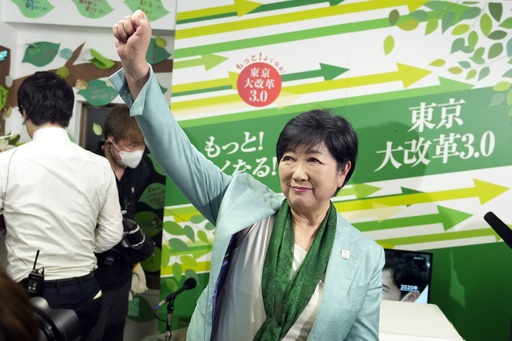Eight years ago, Yuriko Koike made history by becoming the first female governor of Tokyo, besting her male predecessor. Recently, she secured her third term as governor in an election that featured one of her primary challengers as another woman. In Japan, where gender equality rankings are low, having multiple women vying for top political positions remains uncommon, but Koike’s victory signals a gradual increase in influential female figures and a society that is becoming more accepting of gender balance in politics. Nevertheless, despite these advancements, men still overwhelmingly dominate politics in Japan, and considerable efforts are required to achieve equal representation.
Chinami Nishimura, a parliamentarian from the Constitutional Democratic Party of Japan, stated that there is a growing expectation for women to have a more significant role in politics, emphasizing how crucial it is for women to showcase their presence and have their voices heard in a field still largely viewed as male-oriented. Nishimura is striving towards having women constitute 30% of her party’s candidates in the next national election. In contrast, the Liberal Democratic Party, led by Prime Minister Fumio Kishida, has pledged to achieve 30% female representation within a decade and is actively recruiting more female candidates.
Despite the progress, there are considerable challenges in finding aspiring female candidates in Japan, as societal expectations often place women in roles predominantly focused on childcare, elderly care, and other familial responsibilities. Additionally, the demanding nature of a parliamentarian’s job, which involves frequent travel between Tokyo and their constituencies, creates further hurdles for female lawmakers balancing their careers and family life.
Although there is a rising interest among women in pursuing political careers in Japan, they remain a minority, especially at the national level, where electoral decisions are largely controlled by closed-door, male-dominated party dynamics, making it challenging for outspoken women who often become targets. The attention garnered by powerful women in politics, such as in the Tokyo governor’s election, sends a positive message that women can lead in politics, but it also underscores the existing gender biases within Japanese society, according to experts.
Notably, a survey conducted in 2022 revealed that about a third of female lawmakers faced sexual harassment during election campaigns or while at work. The current representation of women in Japanese politics remains low, with women accounting for 30% of the Tokyo assembly, while the national lower house sees a meager 10.3% female representation, ranking Japan 163rd out of 190 countries in terms of gender equality in parliament.
Despite the slow pace of change, with calls for more female voices in Japanese politics growing, there are still regions in the country, particularly rural areas, where traditional gender roles persist, leading to assemblies with no female representation. Additionally, the lack of female seniority, limited leadership opportunities for women, and the slow pace of leadership change contribute to delays in implementing gender equality laws and policies.
While progress has been made, including the increase in the number of female ministers in recent years, challenges persist due to the underrepresentation of women in leadership roles. Experts emphasize the importance of having role models in politics to inspire women to aim for top positions and advocate for gender equality. The potential for Japan to have a female prime minister, although symbolic, is seen as a significant step forward, symbolizing progress towards gender equality and challenging societal expectations regarding women’s roles in politics.


